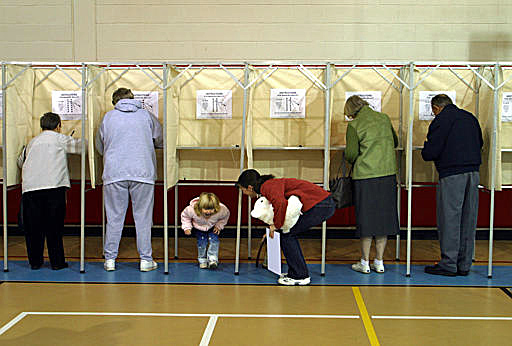
If President Barack Obama wins re-election, his supporters may want to thank Hurricane Sandy.
While voter turnout on the East Coast could be reduced as a result of the superstorm, the president may get a national bump for responding quickly to the disaster, experts say.
Lower turnout
"The most likely outcome is that turnout would be depressed, especially in the areas that are without power," said Nathan Kelly, a political scientist at the University of Tennessee Knoxville.
For many people, finding shelter and getting power will take precedence over going to the polls Tuesday.
And Hurricane Sandy left hundreds of polling places flooded or in the dark, so election officials are scrambling to find new locations.
In New York, many polling sites have moved, and voters may have to call their county election board to find the new locations, according to the New York State Board of Elections website.
Get the world’s most fascinating discoveries delivered straight to your inbox.
In New Jersey, local county clerk and election offices are staying open over the weekend to accommodate voters whose polling locations have lost power after flooding, the office of the governor said.
Many people will decide it's not worth the trouble, Kelly said.
"People who aren't very habitual voters and very strongly committed voters, in a situation like that where they're having to learn a new place to vote in a matter of a day — they're going to be less likely to vote," Kelly told LiveScience.
The hardest-hit counties are more strongly Democratic than surrounding areas are, so that could hurt voter turnout for Obama.
On the other hand, Kelly said, opinion polls in the states pummeled by Sandy — Delaware, Maryland, Pennsylvania, New York and New Jersey — show the president so far ahead that low turnout is unlikely to shift those states' electoral votes to Republican challenger Mitt Romney.
That could cause a discrepancy between the popular vote and the electoral count. "If hundreds of thousands of Obama supporters stay home and let's say he still wins the election, if it was going to be really close, it might switch that to where Obama fails to win the national vote but still wins the Electoral College," Kelly said.
Bump for Obama
The disaster may provide an unexpected bump nationally for Obama, said Andrew Reeves, a political scientist at the Hoover Institution at Stanford University and Boston University.
Reeves has studied the effect of natural disasters on voting patterns and has found that when a local official asks for federal aid after an earthquake, hurricane or tornado, that official gets a bump of a few points in the polls. Those who don't seek federal aid get dinged. [Natural Disasters: Top 10 US Threats]
Usually, a disaster-related change in voting is seen only at the local level, Reeves told LiveScience.
"When there's a really bad rainstorm or snowstorm and a couple of houses get damaged, and maybe power goes out for a little while, the president might not be the first person you think of as the one responsible," he said.
But because Hurricane Sandy caused so much damage and was so heavily covered in the national news, voters' impressions of Obama could be affected.
Regarding recovery efforts from the storm, Reeve said, "There's this implication that this is President Obama's responsibility."
The president spoke publicly about the federal emergency response well before the superstorm made landfall. Since then, he's been photographed touring devastated coastlines and consoling storm victims. And New Jersey Gov. Chris Christie, a Republican who supported Romney, called the president's response outstanding.
That may help Obama on Tuesday, Reeves said.
"A lot of people watching the president in states that haven’t been affected might be impressed with what they see," he said. "I think it could potentially have a national outcome."
Follow LiveScience on Twitter @livescience. We're also on Facebook & Google+.

Tia is the editor-in-chief (premium) and was formerly managing editor and senior writer for Live Science. Her work has appeared in Scientific American, Wired.com, Science News and other outlets. She holds a master's degree in bioengineering from the University of Washington, a graduate certificate in science writing from UC Santa Cruz and a bachelor's degree in mechanical engineering from the University of Texas at Austin. Tia was part of a team at the Milwaukee Journal Sentinel that published the Empty Cradles series on preterm births, which won multiple awards, including the 2012 Casey Medal for Meritorious Journalism.
 Live Science Plus
Live Science Plus





